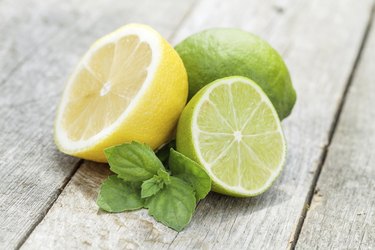
One of the most common health conditions, a urinary tract infection (UTI) can make life difficult. The pain often stays with you all day, not only when you urinate. However, avoiding certain food for UTI can alleviate some discomfort.
Tip
You should avoid certain foods with a UTI. These include caffeinated foods, acidic fruits and alcohol.
Video of the Day
Video of the Day
What is a UTI?
According to the U.S. Department of Health & Human Services (HHS), a UTI is an infection affecting any part of the urinary system — the body's management system for disposing waste, expunging unused water and keeping out bacteria. But sometimes the urinary system fails to do its job and an infection occurs.
A UTI is generally not serious if treated right away. If left untreated, you could experience serious health complications that can lead to kidney damage.
The HHS also says that a UTI happens more often in women than in men — half of this country's women will experience a UTI in their lifetime. Women are more susceptible to the infection because they have a shorter urinary tract than men do.
According to HHS, typical symptoms of a UTI include the following:
- Burning and pain while urinating
- Feeling the need to urinate often, even right after you have done so
- Feeling shaky
- Experiencing pressure in the belly
- Running a fever
According to the Centers for Disease Control and Prevention (CDC), certain risk factors can contribute to a UTI, such as gender, sexual activity, kidney stones, pregnancy, age (the older you are, the higher your risk) and an enlarged prostate.
Treatment of UTI
The National Institute of Diabetes and Digestive and Kidney Diseases (NIDDK) states that one of the most important steps you can take to fix a UTI is to stay hydrated by drinking water as often as possible. This helps flush out the bacteria. You should also see a medical professional for an antibiotic, as a UTI often will not disappear on its own.
The NIDDK also doesn't believe you can eat specific foods for healthy bladder and kidneys, and you can't follow a specific diet to prevent or treat a UTI. Rather, to do your best in avoiding an infection, you should make lifestyle changes.
According to the CDC, these lifestyle changes should include the following:
- Minimizing douching or using any types of sprays around the genital area
- Urinating before and after sexual activity
- Urinating regularly. Try not to "hold it."
- Opting for showers instead of baths
Such simple changes can help prevent your first and recurrent UTIs.
Food for UTI
Certain foods can exacerbate a UTI. You should avoid them after a diagnosis. Such foods include the following:
Acidic Fruits
According to a June 2015 study published in the Journal of Biological Chemistry, researchers found that acidic urine and the presence of small molecules related to your diet can influence how bacteria grows in the urinary tract. For this reason, you should avoid fruits like tomatoes, pineapple and citrus fruits such as lemons, limes and grapefruits.
Caffeinated Foods
As a stimulate that increases the heart rate, caffeine often circulates bacteria quickly to the infected urinary tract. In a January 2016 study published in the Journal of Wound, Ostomy and Continence Nursing, researchers found that eliminating caffeinated products and other beverages such as alcohol can help alleviate UTI symptoms.
To relieve some pain, you could try removing the following from your diet until you heal:
- Coffee (You're better off sticking to decaf.)
- Teas
- Caffeinated sodas
- Alcohol
- Chocolate (With a UTI, chocolate is best avoided. However, if you must have it, dark chocolate has less caffeine than milk chocolate.)
Spicy Foods
You should also avoid spicy foods, such as Indian and Mexican (known for their heavy spice content) during a UTI, according to the Consumer's Handbook of Urological Health published by the Canadian Urological Association. The spice can make your urination feel more painful.
- Journal of Wound, Ostomy and Continence Nursing: “Does Instruction to Eliminate Coffee, Tea, Alcohol, Carbonated, and Artificially Sweetened Beverages Improve Lower Urinary Tract Symptoms?: A Prospective Trial”
- Journal of Biological Chemistry: “Human Urinary Composition Controls Antibacterial Activity of Siderocalin”
- National Institute of Diabetes and Digestive Diseases and Kidney Diseases: “Bladder Infection (Urinary Tract Infection—UTI) in Adults”
- Centers for Disease Control and Prevention: “Urinary Tract Infection”
- U.S. Department of Health & Human Services: “Urinary Tract Infection (UTI)”
- Canadian Urological Association: "Consumer's Handbook of Urological Health